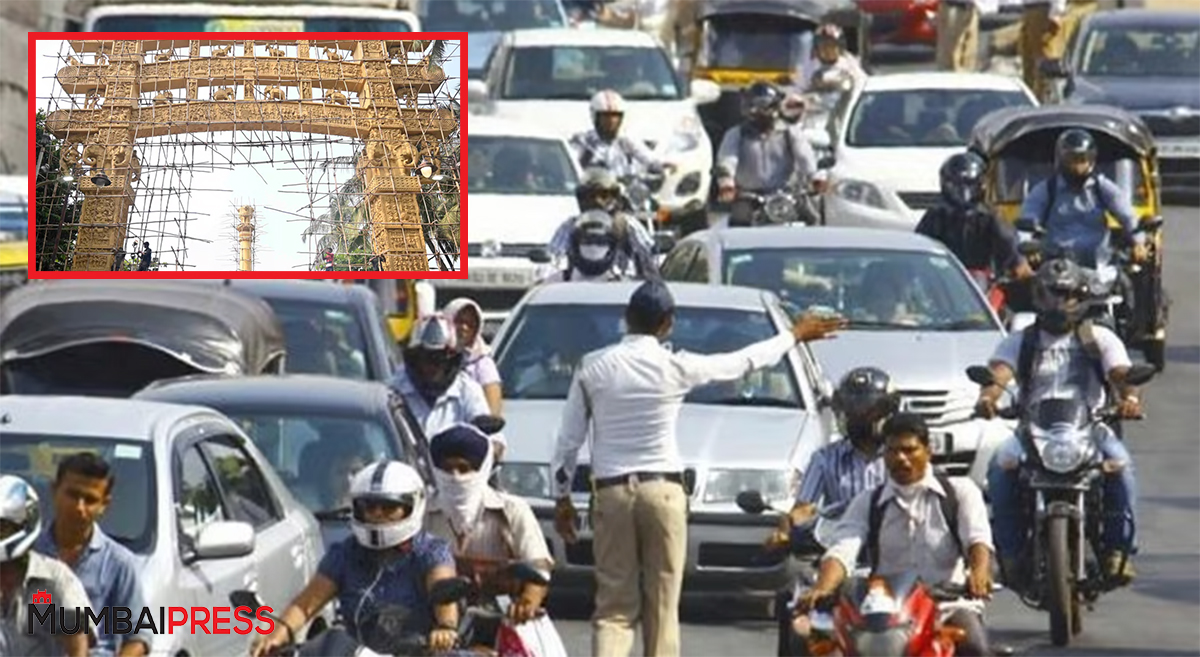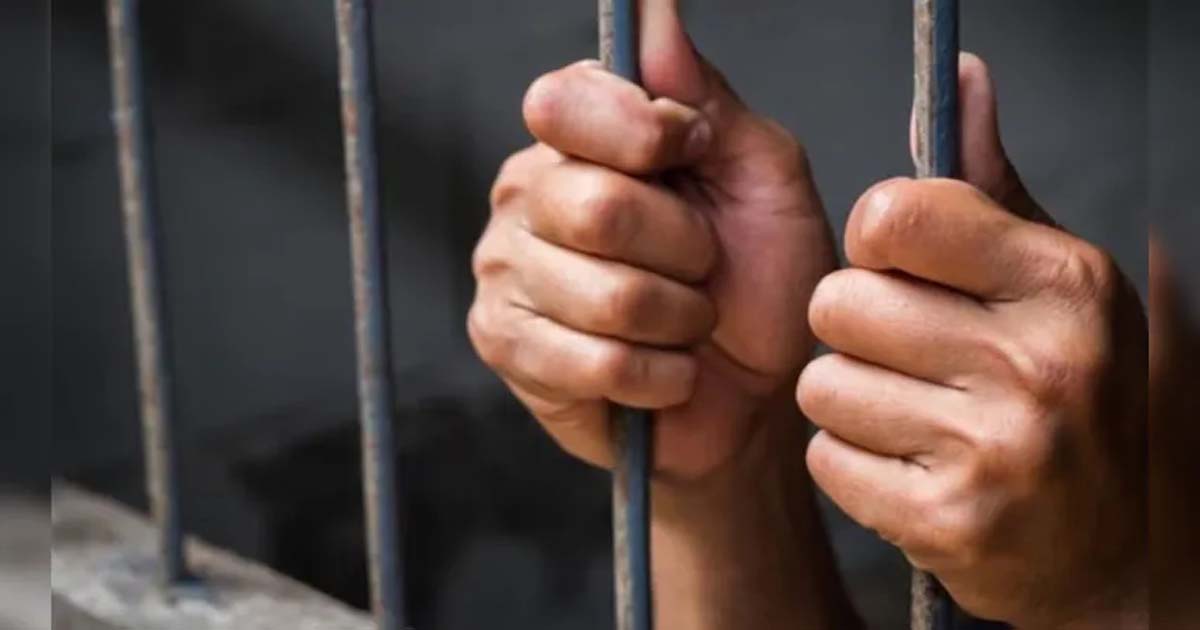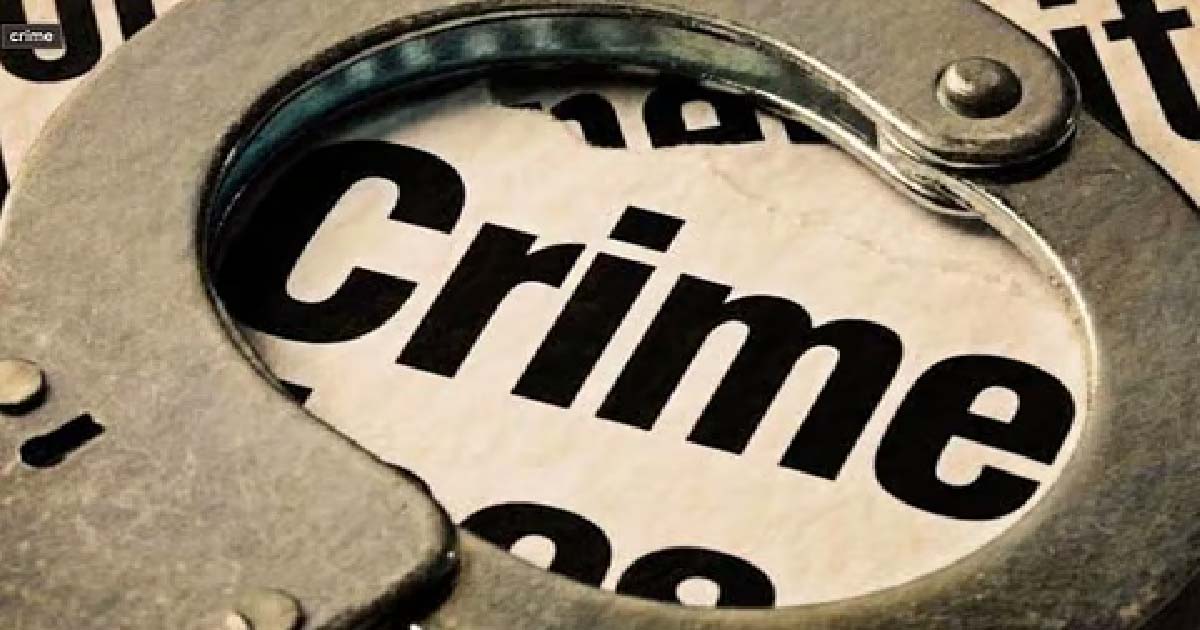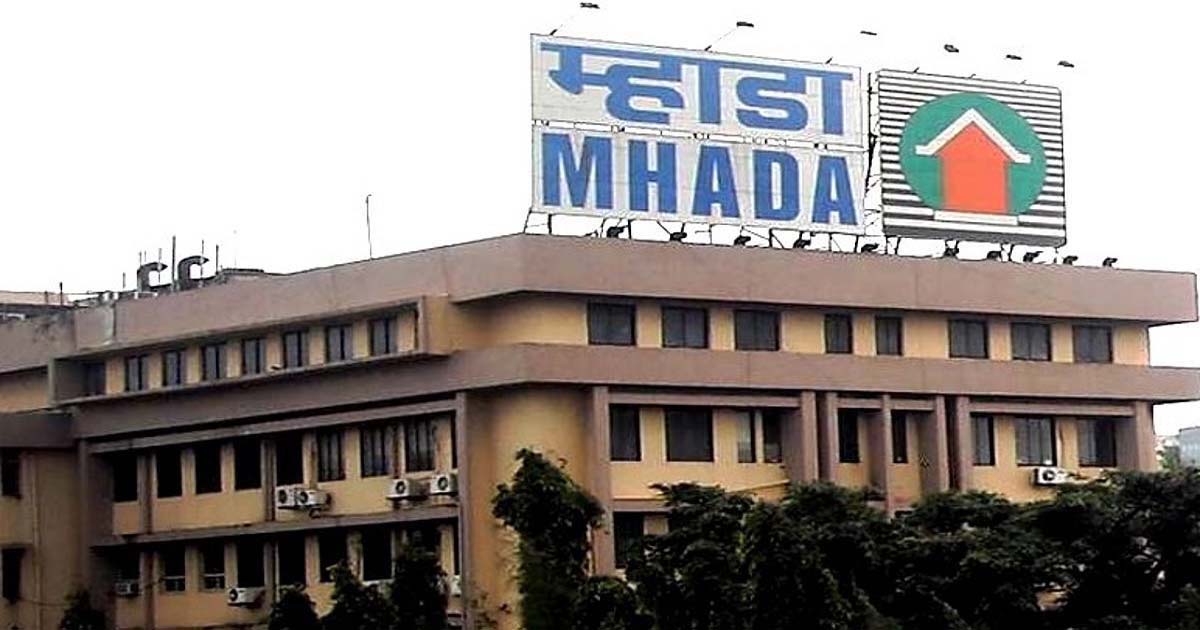General
BR Ambedkar Mahaparinirvan Diwas: Mumbai Traffic Police Announces Diversions & Closure At Dadar Till Dec 7; Details Inside

The Mumbai Traffic Police has announced new traffic diversions for Dadar starting Tuesday till December 7, for the 67th death anniversary of Dr. Babasaheb Ambedkar, which will be observed on December 6 at Dadar’s Chaitya Bhoomi as “Mahaparinirvan Divas”.
According to the notification, a large number of followers of Ambedkar is expected to visit Dadar from various parts of the state which will in-turn cause traffic congestion, at and around the Shivaji Park area.
Several roads will be closed for vehicular traffic, or be made into a one-way road. The ones closed are Swatantryaveer Savarkar Road – from Siddhivinayak Temple Junction to Hinduja Hospital. Ranade Road, Dnyaneshwar Mandir Road, Jambhekar Maharaj Road, Keluskar Road (both bonds), M.B Raut Road will all be closed for vehicular traffic. TH Katariya Road shall be closed from LJ Road Shobha Hotel Junction to Aasavari Junction. The north bound of S.K Bole Road will be closed from Siddhivinayak Temple junction to Portuguese Church junction.
The roads which will be a ‘no-entry’ for heavy vehicles are S.V.S Road from Mahim to Hardikar Junction, L.J Road from Mahim junction to Gadkari junction, Gokhale Road from Gadhkari junction to Dhanmil Naka, Senapati Bapat Road from Mahim railway station to Vadacha Naka, and Tilak Bridge from Dadar TT Circle to Veer Kotwal Udyan to all of the N.C Kelkar Road.
Way of Traffic
South Bound Traffic – Vehicles coming from Western Express Highway are to take left turn from Kalanagar Junction, proceed towards Dharavi T Junction to Sion Railway station or 60 feet road via Kumbharwada to Sion Hospital – and turn right to Dr. BA Road or use Bandra-Worli Sea Link to reach through L.J Road or Senapati Bapat Road.
North Bound Traffic – Vehicles coming from Colaba and CST through B.A Road or Annie Besant Road shall use P D’Mello Road, Barrister Nath Pai Road, Zakaria Bunder Road, R.A.K Marg up to Matunga, take right under Arora Bridge and proceed along Dr. B.A Road further via Sion Hospital or the Worli-Bandra Sea Link towards north Mumbai.
North Bound vehicular traffic coming from Mahalaxmi Railway station via Dr E Moses Road, are to proceed via Rakhangi Chowk, take right towards Senapati Bapat Road and proceed to their destination.
Eastern Express Highway = Vehicles coming from EEH on way to south shall use Wadala bridge, Barkat Ali Naka, BPT Colony and Eastern Freeway for their further destination.
The pre-declared no-parking zones are as follows:
Swatantra Veer Savarkar Road, Dnyaneshwar Mandir Road
Jambhekar Maharaj Road
Ranade Road
Keluskar Road (south and north)
M.B Raut Road
Pandurang Naik Road
N.C Kelkar Road
Dr. Vasantrao J Raath Road from SVS Road up to Amego Hotel
S.H Palarkar Road from S.S Road to Millerniyam Building
D.S Babrekar Road from Suryavanshi Hall junction to Vision Crest Building
Kirti College lane from Kirti College signal to Miramar Society
Kashinath Dhuru Road – from it’s junction to Aagar Bazar Circle
L.J Road from Shobha Hotel to Gadkari junction
Karariya Road from Gangavihar junction to Shobha Hotel and Aasavari Junction
Hindu Colony Road No. 1 to 5 along Rajgruha Premises
Lakhamshi Nappu Road Shubham Hotel to Ruia College up to Dadkar Ground
Khareghat Road no. 05 to Patkar Guruji Chowk
Lady Jehangir Road – from Ruia College junction to Five Gardens to St. Joseph School
RA Kidwai Road from Arora Junction to Lijjat Papad Junction
Nathala Parekh Road from St. Joseph School to Khalsa College
Swami Gyan Jivandas Road from Swami Narayan Temple to Pritam Hotel
Parking Places Available
Senapati Bapat Marg, Mahim and Dadar West
Kamagar Stadium
India Bull International Center, Senapati Bapat Road, Elphinstone
India Bills 1 Center, Jupiter Mill Compound, Elphinstone West
Kohinoor Square, Kohinoor Mill Compound
Lodha, Kamala Mill Compound, Senapati Bapat Road, Lower Parel
Five Garden Lady Jehangir Road, Matunga East
Adenwala Road, Matunga East
Nathalal Parekh Road, Matunga East
RAK CHaar Road Wadala West
Reserve lanes will be made available for emergency vehicles on the south bound from Siddhivinayak Junction to Kapad Bazar Junction.
Mumbai Press Exclusive News
Jogeshwari POCSO case: Accused out on bail arrested again

Mumbai: A fugitive accused involved in the Mumbai Pisco case has been arrested again by the Jogeshwari police after 6 years. In Jogeshwari, Mumbai, accused Pankaj Panchal, 27, was arrested in 2019 in the Pisco child abuse and exploitation case and was on bail but was absent from court proceedings and had been hiding his identity for the last 6 years. The police received information that the accused had come near the SRA building, on which the police laid a trap and succeeded in arresting the accused from Jogeshwari. The court had also issued a non-bailable warrant against him, after which the police complied with it and arrested him and presented him in the court and the court has sent him on remand. The police are investigating further. This information has been given by DCP Datta Nalawade of Mumbai Police Zone 10.
Maharashtra
Milind’s gangsters are a symbol of the city’s destruction, action is being taken under MPDA

Mumbai: Milind Police have taken action against Tek Shankar Dhotre, who created terror here by intimidating shopkeepers, passers-by and rickshaw drivers and collected money by threatening them. The action has been taken on the instructions of Additional Commissioner Mahesh Patil. The accused is a terror in the area. A total of 6 cases of violence against him have been registered against him for collecting money. He intimidates traders and shopkeepers and collects money from him every month. No one used to speak out against him. In such a situation, the police took the complainant into confidence and took action against him. He is a terror in Milind. After taking action under the MPDA, the accused was taken into custody and deported from Mumbai to other cities. The Mumbai Police has now started action against such goons to restore the trust of the public towards the police so that the public’s trust in the police is established and the fear of the police remains in the hearts of the goons.
Mumbai Press Exclusive News
MHADA to Blacklist Developer, File Criminal Case in Nagpada Redevelopment Mess

Mumbai: In a significant move aimed at protecting long-awaited tenant rehabilitation, the Maharashtra Government has approved the compulsory acquisition of three severely dilapidated buildings in Nagpada—Taumbawala Building, Deoji Darsi Building, and Zohra Mansion—after a decade-long delay in redevelopment.
The approval, issued through a Government Resolution dated 28 November 2025, empowers MHADA to take control of the stalled project under the amended provisions of the MHADA Act, 1976, following recent directions from the Bombay High Court.
The three buildings, located on Chhouthi Peer Khan Street and falling under C.S. Nos. 1458, 1459, and 1460 in the Byculla Division, were part of an extensive redevelopment plan covering several structures, including Building Nos. 13–13A, 13B, 15, 17, 19, 21–23, 31–33, and 35–37.
Although the developer managed to complete the structural framework of a proposed ground + 20-storey tower, the project has remained stagnant for nearly ten years. Key failures highlighted by authorities include:
- Not providing permanent housing to tenants
- Non-payment of transit rent for the last three years
- Extremely slow progress in internal construction
- Rising complaints and grievances from tenants
The situation prompted affected tenants to approach the Bombay High Court. On 1 October 2025, the Court directed the State to take necessary action under the MHADA Act, setting the stage for the latest government intervention.
Acting on MHADA’s proposal, the State Government has now sanctioned the compulsory acquisition of the 1,532.63 sq. m. land parcel on which the three buildings stand. MHADA will assume control to complete the long-pending redevelopment work and ensure rehabilitation of residents.
As part of the acquisition process, the government has laid down several mandatory conditions:
The developer must submit complete details of:
- Third-party rights
- Bank loans and financial liabilities
- Any other encumbrances
Only after reviewing these disclosures will the State grant final approval.
The government has ordered:
- Blacklisting of the developer
- Criminal proceedings for negligence and failure to fulfill obligations
- Intimation to agencies including the BMC and other relevant departments
MHADA and the Mumbai Building Repair and Reconstruction Board must adhere to the Housing Department’s guidelines issued on 22 August 2023, and secure all required approvals before taking over the project.
Authorities have also been instructed to initiate immediate legal and administrative measures to take physical possession of the property.
Redevelopment of Mumbai’s aging and precarious buildings has long been plagued by delays, disputes, and stalled projects. The State’s decision to step in reinforces the strengthened provisions of the MHADA Act, which empower authorities to take over unsafe and defaulted redevelopment projects in the interest of residents.
With the acquisition now cleared, MHADA will move ahead with completing the redevelopment and finally rehabilitating the displaced families of Zohra Mansion, Taumbawala Building, and Deoji Darsi Building—offering hope to tenants who have waited more than a decade for secure housing.
-

 Crime3 years ago
Crime3 years agoClass 10 student jumps to death in Jaipur
-

 Maharashtra1 year ago
Maharashtra1 year agoMumbai Local Train Update: Central Railway’s New Timetable Comes Into Effect; Check Full List Of Revised Timings & Stations
-

 Maharashtra1 year ago
Maharashtra1 year agoMumbai To Go Toll-Free Tonight! Maharashtra Govt Announces Complete Toll Waiver For Light Motor Vehicles At All 5 Entry Points Of City
-

 Maharashtra1 year ago
Maharashtra1 year agoFalse photo of Imtiaz Jaleel’s rally, exposing the fooling conspiracy
-

 National News1 year ago
National News1 year agoMinistry of Railways rolls out Special Drive 4.0 with focus on digitisation, cleanliness, inclusiveness and grievance redressal
-

 Maharashtra1 year ago
Maharashtra1 year agoMaharashtra Elections 2024: Mumbai Metro & BEST Services Extended Till Midnight On Voting Day
-

 National News1 year ago
National News1 year agoJ&K: 4 Jawans Killed, 28 Injured After Bus Carrying BSF Personnel For Poll Duty Falls Into Gorge In Budgam; Terrifying Visuals Surface
-

 Crime1 year ago
Crime1 year agoBaba Siddique Murder: Mumbai Police Unable To Get Lawrence Bishnoi Custody Due To Home Ministry Order, Says Report












